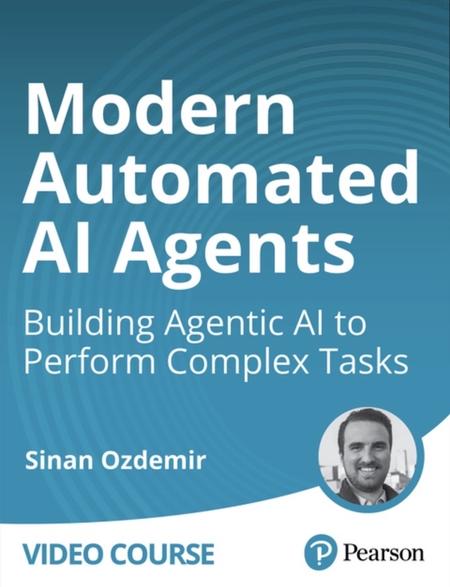English | MP4 | AVC 1280×720 | AAC 44KHz 2ch | 5h 37m | 1.73 GB
Get started with automated AI agents
Modern Automated AI Agents introduces you to the concept of automated agents. It then helps you build a solid understanding of how to design, build, and optimize AI agents to tackle real-world challenges.
Learn How To:
- Build & use AI agents
- Evaluate AI agent frameworks
- Start to use CrewAI
- Design multi-step workflows with LangGraph
- Use large language models (LLMs)
- Integrate existing and custom tools
- Use thought, action, observation, and response components
- Test and evaluate agents, their responses, backstories, definitions, and rules
- Add planning and reflection to agents to bolster performance
- Who Should Take This Course:
Developers, data scientists, and engineers who are interested in building intelligent, autonomous AI agents capable of solving complex problems and adapting to dynamic environments
Course Requirements:
- Python 3 proficiency with some experience working in interactive Python environments including Notebooks (Jupyter/Google Colab/Kaggle Kernels)
- Comfortable using the Pandas library and either Tensorflow or PyTorch
- Understanding of ML/deep learning fundamentals including train/test splits, loss/cost functions, and gradient descent
Lesson 1: Introduction to AI Agents
Lesson 1 explores the components of a modern AI agent, their core components, and how they differ from the LLMs under the hood. You learn how agents automate tasks, make decisions, and adapt to dynamic environments to deliver impactful results.
Lesson 2: Under the Hood of AI Agents
Lesson 2 dives into the mechanics of AI agents, exploring the different types of LLMs and how one type in particular of LLM, the autoregressive model, powers virtually all agent workflows. You gain insight into how tools, prompts, and agent contexts work together to create intelligent AI agent systems.
Lesson 3: Building an AI Agent
In Lesson 3, it is time to put theory into practice by designing and building your own fully functional AI agent framework. You integrate tools, construct a viable prompt, and learn to handle user inputs dynamically to create adaptable end-to-end agentic systems.
Lesson 4: Testing and Evaluating Agents
Lesson 4 focuses on measuring agent performance using simple metrics such as accuracy, response time, and task completion rates before graduating to more advanced strategies for addressing structural agentic biases and ensuring reliable outcomes of generative agent responses.
Lesson 5: Expanding on ReAct with Planning and Reflection
In this lesson, we will enhance our own agents with planning and reflection techniques, allowing them to reason through tasks with a bit more care. These methods will enable our agents to handle even simple workflows with more scrutiny and generally result in a higher quality output.
Lesson 6: Advanced Applications and Future Directions
In the previous lessons you’ve built agents, iterated on them, tested them, but what’s next? Lesson 6 covers emerging trends like meaningful multi-agent collaboration, real-time data integration, and ethical considerations of automating certain types of work.
Table of Contents
Introduction
Modern Automated AI Agents: Introduction
Lesson 1: Introduction to AI Agents
Topics
1.1 Overview of AI Agents and Their Applications
1.2 Leading AI Agent Frameworks
1.3 First Steps with Agents with CrewAI
1.4 Designing Multi-Step Workflows with LangGraph
Lesson 2: Under the Hood of AI Agents
Topics
2.1 Understanding Large Language Models (LLMs)
2.2 Introduction to Tool Integration
2.3 Key Agent Components: Thought, Action, Observation, Response
Lesson 3: Building an AI Agent
Topics
3.1 Building Custom Tools
3.2 Building Our Agent Prompt
3.3 Using Our Agent
Lesson 4: Testing and Evaluating Agents
Topics
4.1 How to Evaluate Agents
4.2 Evaluating Tool Selection and Use
4.3 Assessing the Quality of Agent Responses
4.4 Evaluating Agent Backstories, Task Definitions, and Rules
Lesson 5: Expanding on ReAct with Planning and Reflection
Topics
5.1 Why Agents Fail
5.2 Plan and Execute Agents
5.3 Reflection Agents
Lesson 6: Advanced Applications and Future Directions
Topics
6.1 Exploring Additional Tools and APIs
6.2 Future Trends in AI Agents
Summary
Modern Automated AI Agents: Summary
Resolve the captcha to access the links!
